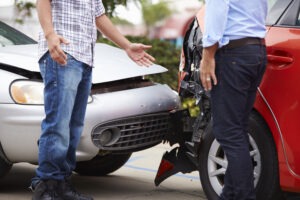
If the other driver denies responsibility for an accident, you can still seek to recover compensation. This could include outlining a compelling case for their insurance carrier, taking it to trial, and letting a judge or jury decide.
Working with a car accident lawyer will help determine your options and proceed with a claim or lawsuit. Most personal injury law firms provide free initial consultations for crash victims. Contact a personal injury firm near you for your free case assessment.
A Strong Case Could Support an Insurance Payout
Even if the at-fault driver in your crash denies responsibility, a case supported by strong evidence could convince their insurance company to pay fair compensation. The insurance carrier understands that a solid case showing fault and liability would likely win at trial, regardless of the policyholder’s allegations.
However, the insurance company likely will not want to pay. It will support their policyholder and deny the claim or offer only lowball settlements unless convincing evidence supports your financial recovery.
If the other driver denies their role in causing your crash, working with a car accident attorney might be necessary. A legal team that builds cases regularly knows how to uncover evidence, present it convincingly, and take a civil suit to trial if necessary.
For a free legal consultation, call,
(888) 585-2188
Some Car Accident Cases Can Go to Trial
Under some circumstances, a car accident case will not settle out of court. While most cases settle before a lawsuit begins or during the legal process, others require presenting a strong case to the judge or jury and letting them decide. When this occurs, the outcome is in the court’s hands. For this reason, most insurance companies, victims, and law firms try to avoid it. Still, sometimes it is unavoidable.
A civil trial usually occurs only because the parties involved cannot reach common ground. Both sides present evidence during the trial to show what they believe happened. The victim’s lawyer provides documentation indicating the other driver caused the collision and resulting injuries. The defense lawyer often alleges a different cause or blames another party.
In the end, the judge or jury determines which party is correct. When they rule on behalf of the plaintiff—the victim—they generally award monetary damages. This is the compensation necessary to pay for medical bills, cover lost wages, and more.
What Do I Need to Show to Prove Liability in a Car Accident Case?
When a driver acts carelessly or recklessly behind the wheel, it can cause a crash. In the legal world, this is known as negligence. If a driver is negligent, they might be legally responsible for the expenses and losses incurred. This requires the victim to have evidence showing four things:
- The driver owed them a duty of care, usually to follow a specific traffic law.
- The driver breached the duty of care, violating that law.
- Their breach was the collision’s proximate, or direct, cause.
- The victim suffered harm, which could include injuries and financial losses.
Showing negligence occurred and that the driver caused the crash should be enough to overcome the at-fault party’s denial and convince their insurance company that they should negotiate for a payout. You will also document the claim’s value to ensure you receive an appropriate offer.
If the insurance company does not find the case compelling and denies the claim or refuses to offer a fair payout, a lawsuit might be necessary. Your attorney can handle this process and represent your best interests to the judge and jury.
What Evidence Is Available to Build a Compelling Case?
The evidence you might need to convince the insurance company their policyholder caused your crash will depend on the details of the accident. Numerous steps are necessary to identify, gather, and organize evidence into a convincing argument for compensation. If you work with an auto accident law firm, your attorney will manage this process.
Some of the commonly used evidence in car accident cases include:
- The police accident report filed after responding to the crash
- Accident scene survey
- Interviews with eyewitnesses
- Physical evidence
- Relevant medical records
- Accident reconstruction
- Expert options
- Documentation of damages, such as medical bills, receipts, and estimates
Complete a Free Case Evaluation form now
How Can an Attorney Help With My Car Accident Case?
When you work with a personal injury lawyer, you can focus fully on your treatment, healing, and rehabilitation. You do not have to wonder about your next steps or how to navigate the claims process. Your lawyer handles all aspects of your case and updates you regularly about your case’s status.
From investigating what happened to filing your claim and managing all communication with the insurance carrier, your lawyer will work to develop a compensation case that recovers fair compensation for you. They will seek justice in your case even if the other driver denies responsibility for the accident or other concerns arise. They will file a lawsuit and prepare your case for trial when necessary.
Your attorney should not ask you to pay anything up front. Most car accident lawyers represent crash victims based on contingency fees. They charge fees only after the case ends and if they recover money for you. Their fees come directly from the money secured in your car accident case.
Call or text (888) 585-2188 or complete a Free Case Evaluation form
Talk to Our Team About Your Car Accident Case for Free Today
Jenner Law provides free consultations for those hurt in Baltimore area car accidents. Our team will review your case, answer your questions, and explain your options if the at-fault driver denies responsibility for your crash.
Contact us via telephone or our online contact form to get started today.
